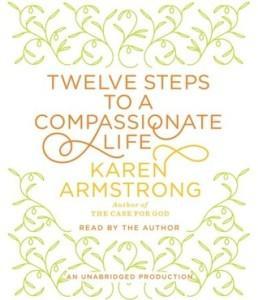 A process for developing personal compassion to engage in compassionate community for a more compassionate world
A process for developing personal compassion to engage in compassionate community for a more compassionate worldWelcome to the fourth Compassionate Sunday. We’re working through Twelve Steps to a Compassionate Life by Karen Armstrong, one step per month.
February is devoted to The First Step: Learn About Compassion. If you’d like to share what you’ve learned about compassion in February (or before), share a post in the link list below or join the discussion in the comments or on Facebook.
For the last post of each month during this 12-month exploration of Twelve Steps to a Compassionate Life, I’m going to take a piece of advice from the Reading Group Guide found on the Charter for Compassion’s website: to resolve to introduce one new practice into my life, an action that will be “a dynamic and positive force for change.”
My first thought (as a librarian, reader, and book blogger) was to read more books! Say, a book a month for the next year. I had a whole post composed with a list of possible books selected from the bibliography of Twelve Steps to a Compassionate Life.
But, then, something intriguing happened on Facebook. Four different people, none of whom know each other, shared a link to a Huffington Post article about a new series of classes, taught by Harvard professors, to increase religious literacy. I shared it to my timeline and six more people shared it from there. That’s a lot of interest!
The series begins March 1 with a four-week introduction about world religions and is followed by a course each about Christianity, Buddhism, Islam, Hinduism and Judaism. In the article, “Moore suggested that religious literacy should include an understanding that religious traditions are ‘internally diverse,’ ever-evolving, and play complex roles in people’s lives.”
That sounds perfect to follow up on Step One from Twelve Steps to a Compassionate Life, given this advice near the end of the first chapter:
…we must get to know about our neighbors in the global village and realize that our own tradition is not alone in its pursuit of the compassionate ideal. The comparative study of other religions is not designed to dilute your appreciation of your own or to make you convert to another tradition. Ideally it should help you to see the faith that you are most familiar with in a different, richer light. Each of the world religions has its own particular genius, its own special insight into the nature and requirements of compassion, and has something unique to teach us. By making room in your mind for other traditions, you are beginning to appreciate what many human beings, whatever their culture and beliefs, hold in common. (p 63)
This series, offered on Harvard’s edX platform, is what is known as a massive open online course, or MOOC. This one promises to be particularly massive — 50,000 people is the estimate in the Huffington Post article. Given how much attention it’s been getting, I wouldn’t be surprised if it were more than that. That’s a lot of energy focused on religious literacy around the world!
I’ve never taken a MOOC but I’ve been meaning to ever since I first heard about them. This series might as well be my first MOOC.
The introduction page for the series makes it look like you’ll be paying $50 per course, but when you enroll there’s an option to audit for free. I enrolled for all six courses as my pledge to continue learning about compassion, following Step One of Twelve Steps To a Compassionate Life.
Does anyone want to join me? Let me know–maybe we can find each other in the massive numbers of people who take the course.
